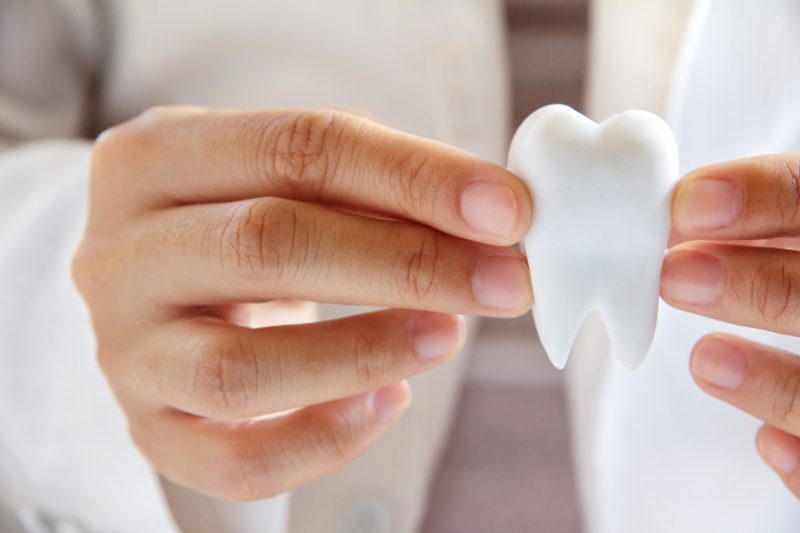5 Dental Health Myths You Can Forget About

Your dental health is important to your overall health–it’s an access point to your body. Figuring out the truth about these myths is essential to a healthy you. Here are 5 dental health myths you can forget about so you can become more confident in your oral hygiene habits.
Myth 1: Whiter Teeth = Healthier Teeth
All over the television and in magazines, companies advertise a brighter smile. They offer products designed to turn your teeth sparkly white and they promise that your teeth will never be healthier. This leads to the assumption that white teeth equal healthy teeth.
All these tooth whitening products do is “bleach” the enamel of your teeth. They don’t clean, don’t break down the nasty bacteria lurking in your mouth and don’t find the problems hidden deep inside the gums. They simply make your teeth look white. If this is what you want – go for it. What’s most important to remember, however, is that nothing compares to taking care of your teeth the right way. Consistent brushing, flossing, taking trips to the dentist, and even doing the best TMJ exercises for your jaw because these are the keys to a healthy mouth, teeth, and gums.
Myth 2: Diet Soda is Safer for the Teeth
As a child, you may have seen science experiments that show how a beverage decays a tooth. It usually involves placing a separate tooth in milk, water, fruit juice, and soda. After a while, you make observations and discover which one does the most damage. Soda usually comes out looking like a major villain as the enamel of the tooth is eaten away in the process. Many attribute this fact to the sugar content in soda.
Sugar in drinks has led to, what’s being called, an obesity crisis in children and adults. Dentists have warned against children drinking it at all and for adults to cut back on consumption. People have since moved on to diet soda in droves thinking it was healthier for the body and for teeth. While the sugar content in diet soda is non-existent-though one could argue about the damage that sugar substitutes may cause-acid is emerging as the major culprit for tooth decay.
Water has a pH level of 7.0, which is perfectly safe and healthy for the body. Dentin, the bonylayerof your tooth below the enamel begins to dissolve at a pH level of 6.5. Enamel, the surface layer of the tooth, dissolves at a level of 5.5. The lower a pH level drops, the more acidic and more damaging to the teeth the beverage is. The most popular soda on the market has a pH content of 2.38. This is a crazy low number and it’s no wonder that soda causes major damage to teeth. When looking at the pH level of the most popular diet soda on the market, we find the number 3.28. This is not much higher than the full sugar soda and the damage being done to the dentin and enamel is terrible.
If you want to drink a soda, root beer seems to be the best bet. At a pH level of 4.5, it’s one of the highest pH contents for a carbonated beverage. Beverages are sneaky and can damage teeth without you knowing.
Myth 3: Toothpaste Contains All the Fluoride Needed for Healthy Teeth
One of the bigger dental health myths that have spread around the internet has even found research to back it up. It’s easy to find someone who claims that fluoride in our drinking water and toothpaste is lowering our IQ’s. Many of these studies that purport to be truth have been questioned by leading researchers and doctors. They say that the myths come from foreign countries where people use water with double or triple the amount of fluoride. Even more suspect, the results can’t be duplicated by American researchers.
The myth about fluoride is easy to debunk because fluoride is a naturally occurring mineral in our drinking water. Researchers have found that water supplies with fluoride have a populace with healthier teeth than water supplies without fluoride. Dentists have tested the exact amount required for healthy teeth development and maintenance. They’ve worked hard to ensure that countries have the appropriate amount for the overall health of the population.
Myth 4: A Hard Toothbrush Works Better Than a Soft Toothbrush
It seems obvious that a hard toothbrush, with more rigid bristles than a soft toothbrush, is better for brushing your teeth. Logically, the hard bristles should be able to penetrate plaque build-up better than soft. Experts have shown, however, that with proper use, a soft-bristled toothbrush is a much better option.
Hard-bristle toothbrushes scrape off the top layer of teeth, called enamel, leaving them open to cavities, gum disease, and other harmful bacteria that can invade the mouth. Soft-bristle toothbrushes massage the teeth and gums, knocking lose any of the gross bacteria, leaving your mouth healthy for the long term.
Myth #5: Everyone Should Have a Dental Check-up After 6 Months
While it’s true that some people should have check-ups every 6 months due to already existing issues, most people only require yearly check-ups. With proper dental hygiene, your teeth are stronger than you think. Brushing after meals, flossing each day, and incorporating teeth-safe mouthwash are great ways to make your teeth happy.
Communicating with your dentist is essential to uncovering what problems may appear in the future. Being extra vigilant with your oral care gives you more confidence in your overall health. Finding out the truth to dental health myths is the first step towards a healthy you.